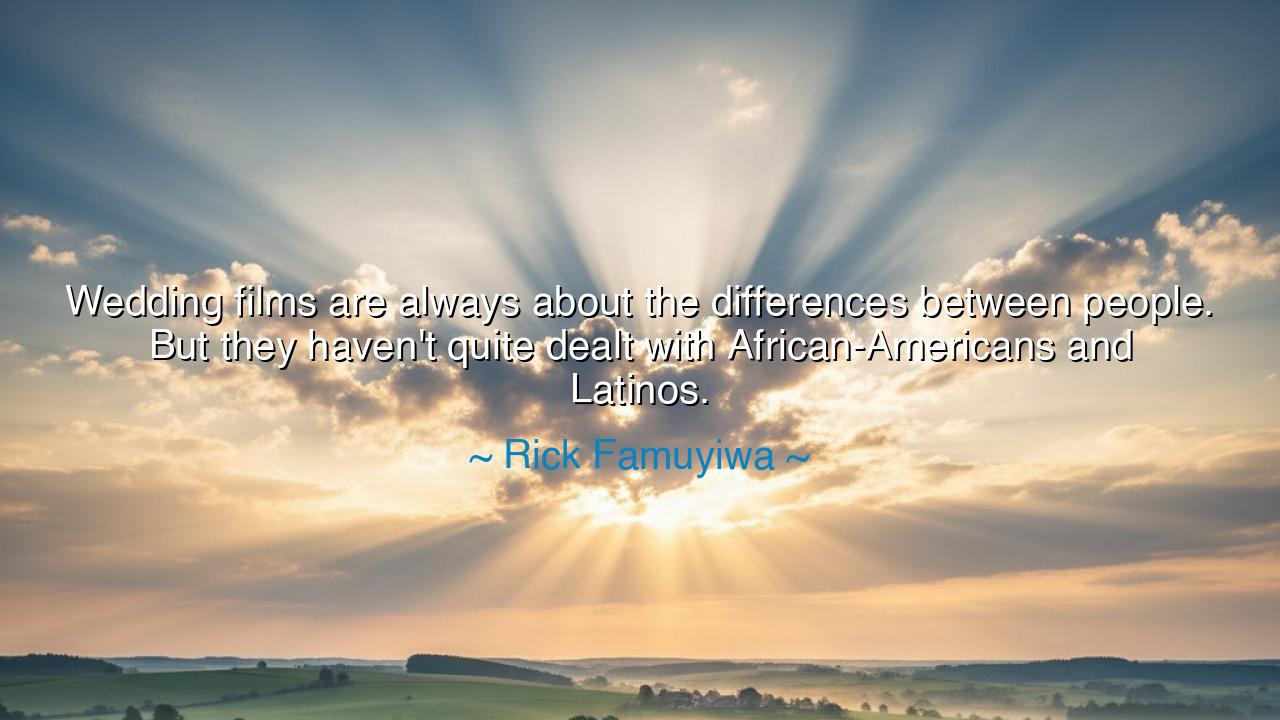
Wedding films are always about the differences between people.
Wedding films are always about the differences between people. But they haven't quite dealt with African-Americans and Latinos.






Rick Famuyiwa, with the insight of an artist who sees beyond the veil, declared: “Wedding films are always about the differences between people. But they haven’t quite dealt with African-Americans and Latinos.” In this truth, he speaks not merely of cinema, but of the absence of voices, of stories untold and perspectives unseen. The wedding, that sacred union where cultures, families, and worlds collide, is a stage where the beauty of difference can shine. Yet too often, the stories of marginalized peoples have been left in silence.
The ancients, too, knew the power of storytelling. Around fires and in temples, they told tales not only of gods and kings but of tribes, nations, and peoples whose differences shaped their destinies. To ignore the story of one people was to wound the fabric of the whole. Famuyiwa’s lament is the same: that in the theater of wedding films, where love and conflict meet, the experiences of African-Americans and Latinos deserve to stand as brightly as any others.
History gives us a parallel in the Harlem Renaissance, when Black poets, writers, and artists began to tell their own stories, countering the silence imposed by centuries. Their words brought to light the struggles, joys, and cultural richness of a people long ignored. So too must wedding films embrace these voices — for what is a wedding if not a union of identities, a celebration where the differences themselves create the drama and the beauty?
Famuyiwa’s words also serve as a challenge. For too long, the lens of storytelling has been narrow, showing only certain unions while leaving others hidden in shadow. To bring forth the stories of African-Americans and Latinos in wedding films is not only to entertain, but to heal, to expand the vision of love itself. It is to declare that love belongs to all, and that every culture has its sacred songs and struggles at the altar of marriage.
Let the generations remember: no tale of love is complete if some voices are silenced. The differences between people are not barriers but bridges, and to tell their stories is to enrich all humanity. As Rick Famuyiwa teaches, the screen must widen, the story must expand, until every people can see themselves in the laughter, tears, and triumphs of a wedding. For in honoring all, we honor love itself.






TPHua Tue Phuong
Rick Famuyiwa’s perspective sheds light on a much-needed conversation in the film industry. There’s a certain lack of depth when it comes to portraying African-American and Latino cultures in wedding films. Do you think this oversight is because filmmakers don’t know how to approach it, or do audiences simply not demand it? It’s an area where more diverse and nuanced stories could really help evolve the genre.
TLNguyn Tki Truk Ly
I think Rick Famuyiwa’s point is quite valid. Wedding films often focus on highlighting the differences between people, yet there’s a distinct lack of representation when it comes to African-American and Latino communities. It’s almost as if these cultures are pigeonholed or ignored. Why do you think these stories aren’t being told? Are filmmakers just not seeing the need for it, or is there a deeper cultural hesitation to address it?
DLDuong Le
Rick Famuyiwa brings up an important issue about the lack of representation in wedding films. It’s true that these films often highlight differences between cultures, but the experiences of African-Americans and Latinos seem to be missing. I’m curious, do you think the shift in cultural narratives will change how wedding films are made, or is it going to take more active effort from filmmakers to change this trend?
BQNguyen Tam Bao Quyen
I see what Rick Famuyiwa is getting at. Wedding films often focus on cross-cultural relationships, but there’s still a gap in truly representing African-American and Latino experiences. Why do you think that is? Are these cultures simply overlooked in mainstream media, or are filmmakers hesitant to dive into these complex narratives? It would be great to see more diversity and inclusion in these types of films.
IIamMythicBoy
This is a fascinating observation from Rick Famuyiwa. It feels like wedding films have become somewhat formulaic in focusing on cultural differences, but there is so much more depth to explore, especially within African-American and Latino communities. What kind of changes do you think could happen in the film industry to start representing these cultures more authentically in wedding narratives? It seems like a natural area for growth in storytelling.